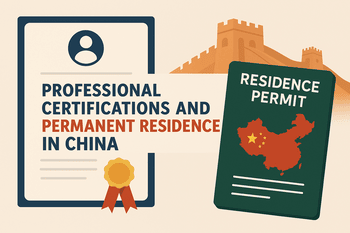
China has long captivated many professionals worldwide—not only for its dynamic economy and rich cultural heritage but also for its evolving immigration pathways.
If you are an expat leveraging your professional skills to build a career in China, attaining professional certifications can be a game changer in your quest for permanent residence.
In this guide, we explore how professional certifications can accelerate your journey to obtaining permanent residency, outline the critical steps in the application process, and provide practical tips for expats navigating this complex landscape.
Understanding Permanent Residence in China
The Chinese government has established several pathways for foreigners to obtain permanent residence.
Traditionally, these routes have focused on significant investments, family reunification, or sustained professional contributions.
However, there is an increasingly important focus on professional excellence—with many pathways specifically recognizing high-level qualifications and professional certifications.
For foreign nationals, securing permanent residence requires meeting stringent criteria:
- adherence to Chinese laws
- maintaining good health
- demonstrating a sound financial background (with consistent tax payment records), and often, achieving an employment history that highlights leadership or highly specialized expertise.
In many cases, expats holding respected professional titles—such as a “professional associate senior” or equivalent—see an expedited review in their applications.
This means that your professional certifications are far more than personal achievements; they are a critical part of your eligibility portfolio.
Chinese authorities, including entities governed under the National Immigration Administration, require detailed documentation that proves both your credentials and your impact on China’s economic and social landscape.
These criteria sometimes include a combination of work permits, tax clearance certificates, recommendation letters from employers, and notably, professional certifications that act as benchmarks for excellence in your field.
The Role of Professional Certifications
Professional certifications are pivotal in today’s competitive job market.
They signal to employers and government authorities alike that you possess verified skills and expertise.
In China’s context, especially for those aiming for long-term settlement, these certifications contribute significantly to the overall evaluation of your application for permanent residence.
Why Certifications Matter
- Validation of Expertise: Accredited certifications confirm that you have met rigorous standards in your profession. This is critical for expat professionals looking to compete in a highly dynamic market.
- Enhanced Credibility: Having reputable certifications is often seen as proof that you are not only skilled but also committed to ongoing professional development. This commitment is valued by both employers and immigration authorities.
- Faster Processing: For some categories—especially those categorized under high-level talent or key professionals—holding a recognized professional certification can speed up the application process for permanent residency. Authorities tend to look favorably on individuals who provide evidence of specialized skills that contribute directly to China’s economic development.
- Broader Opportunities: Besides aiding your permanent residency application, professional certifications can open doors to career advancements, leadership roles, and cross-industry opportunities. They signal a high threshold of competency and reliability within your field.
Key Pathways to Permanent Residence in China
Permanent residence in China isn’t a one-size-fits-all process.
Different pathways are available based on professional achievements, investments, or family connections.
Focusing on professional excellence, here are a few major pathways where certifications play a central role:
| Pathway | Description | General Requirements |
|---|---|---|
| Investment Pathway | For those who have made stable and direct investments in China, demonstrating consistent and responsible financial contributions. | Direct investments with minimum three consecutive years of healthy tax records. |
| Professional Title Pathway | Targets professionals holding positions such as deputy general managers, factory deputy directors, or those with professional associate senior titles. | Must have strong employment history (e.g., four consecutive years) with documented equivalent salaries and certifications attesting to expertise. |
| Talent or Expert Pathway | Designed for foreign high-level experts, especially in science and technology, who contribute invaluable skills to industries identified as critical by the government. | Requires accreditation from national or municipal agencies, an employment-typed residence permit, and additional support documents (e.g., recommendations and tax clearances). |
These pathways underscore that while professional certifications are just one part of a multi-faceted evaluation process, they serve as a significant advantage for those who meet the criteria.
Navigating the Permanent Residence Application Process
The process of applying for permanent residence in China is thorough and demands excellent documentation.
As a professional aiming for this status, understanding the requirements—and ensuring your certifications are up to date—is crucial.
Here are the main elements that most expat applicants will encounter:
Required Documentation
A successful application integrates several key documents.
Alongside general documents like a valid passport and health check certificate, professional letters and certificates of excellence are indispensable.
The table below outlines common documentation needed:
| Documentation | Description | Notes/Source |
|---|---|---|
| Complete Application Form | The official form, typically including details like personal information and a recent photo. | Two copies of two-inch recent photos are usually required. |
| Valid Passport & Residence Permit | Proof of identity and a valid employment-typed residence permit that underscores your legal standing in China. | Often coupled with work permits noted specifically for professionals. |
| Work Permit/Foreign Expert Certificate | Documentation showing you have been legally employed in the country over the past consecutive years; for high-level experts, this means a Foreign Expert Certificate may be required. | This attests to your long-term contribution to the local workforce. |
| Professional Certification | Certificates that verify your expertise. These might include academic degrees, professional training certificates, or industry-specific qualifications. | Essential for showing that you meet the professional title criteria highlighted by immigration authorities. |
| Income Tax Clearance Certificate | Evidence of consistent tax payments over a set period—usually three consecutive years—which supports your financial stability in China. | Validated by local tax authorities, demonstrating fiscal responsibility. |
| Recommendation Letter | A letter from your current employer that endorses your skills, professional background, and the contributions you have made in your role. | Often requires detailed commentary on your expertise and impact in your field. |
| Health Check Certificate | A certificate confirming that you meet the health standards set by domestic or internationally recognized medical institutions. | Ensures that all applicants are in good health as per Chinese immigration requirements. |
Each document plays a strategic role in reinforcing your overall application. Ensuring that your professional certification is current and in line with Chinese standards can help streamline this intricate process.
Tips for Obtaining Recognized Professional Certifications in China
To optimize your application for permanent residency, consider the following strategies centered around professional certifications:
1. Identify Relevant Certifications:
Research and identify certifications that are highly regarded in China within your industry.
Different sectors value particular credentials, from engineering and finance to technology and healthcare.
Look into both international certifications with local recognition and domestic qualifications issued by reputable Chinese institutes.
2. Enroll in Accredited Programs:
Choose training programs or courses that offer certifications recognized by major regulatory bodies in China.
Accredited institutions often have streamlined processes for credential verification, which can be advantageous during your application for permanent residence.
3. Leverage Professional Bodies:
Get involved with industry associations and professional bodies.
Membership in such organizations can sometimes provide access to additional certifications, networking opportunities, and even mentorship programs that further bolster your professional profile.
4. Continuing Professional Development:
The Chinese government values ongoing professional development.
Enroll in continuous learning programs that not only keep your skills current but also add weight to your professional portfolio.
Whether it’s advanced management courses or specialized technical training, evidence of lifelong learning reinforces your commitment to excellence.
5. Stay Updated on Regulatory Changes:
Immigration policies and the criteria for permanent residency may evolve.
It’s critical to monitor updates from official sources, such as the National Immigration Administration for the latest guidelines and any changes that might affect your application.
6. Consult with Immigration Experts:
Navigating China’s immigration process can be complex. Consider consulting with legal and immigration experts who specialize in expat integrations.
Their insights can help you ensure that your professional certifications and other documents meet all the necessary requirements, thereby reducing the risk of delays or complications.
External Resources and Further Reading
For those interested in delving even deeper into the subject, here are some invaluable resources:
- National Immigration Administration Guidelines:
Visit the official guidelines page to get comprehensive details on eligibility criteria and required documentation for permanent residence in China. - Shanghai Government’s Permanent Residence Guide:
For expats planning to apply in Shanghai or similar cities, check out the Shanghai guide that details the application process for foreign high-level experts and talents. - Professional Certification Institutions:
Research local and international institutions that offer reputable certifications relevant to your industry. Many industry leaders publish articles and guides on how to obtain these credentials, which can be a useful supplement to your permanent residency preparations.
Conclusion
Achieving permanent residency in China as an expat is a multi-step process that involves meeting rigorous financial, professional, and legal requirements.
For many professionals, the journey hinges on more than just years of experience; it centers on demonstrable excellence through accredited professional certifications.
These certifications not only validate your expertise but also serve as a testament to your commitment to ongoing professional development.
By understanding the pathways available—whether through investment, professional titles, or high-level talent designations—and by ensuring your documentation is accurate and complete, you can significantly improve your chances of success.
The combination of professional certifications and steadfast preparation makes a compelling case for permanent residence, opening up broader opportunities in one of the world’s most dynamic economies.
Investing in professional development, staying updated on regulatory requirements, and taking strategic steps to optimize your documentation will put you ahead of the curve in the highly competitive arena of Chinese immigration.
With the right qualifications and credentials, securing permanent residence in China becomes not just a possibility but a well-planned journey toward a thriving future in this vibrant nation.



